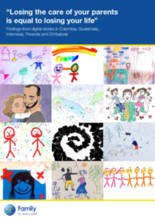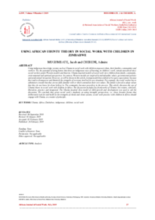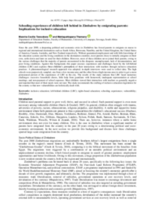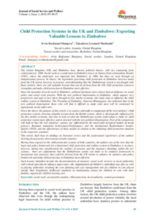Displaying 41 - 50 of 136
This report explores what family means to children and adults in five countries using the digital storytelling technique.
Pese a que hay un consenso sobre la importancia del cuidado efectivo en las familias para los niños, existe una falta de discusión y acuerdo sobre los componentes precisos de este cuidado. Este informe contribuye a debatir sobre este importante tema al proporcionar perspectivas de los grupos focales con 198 niños y 81 adultos de Brasil, Colombia, Egipto, México, Rusia, Ruanda y Zimbabue.
There is extensive research demonstrating clearly the importance of a safe and caring family for child wellbeing and development. While there is consensus on the importance of effective care in families for children, there is a lack of discussion and agreement about the precise components of this care. This report contributes to debates on the components of family care by providing perspectives from nearly 200 children and over 80 adults from Brazil, Colombia, Egypt, Mexico, Russia, Rwanda and Zimbabwe. The report demonstrates that there are many commonalities in perspectives on and experiences of care across contexts.
This article from the Christian Science Monitor describes the Zimbabwean government's efforts to promote domestic adoption amidst "the twin crises of HIV/AIDS and a massive economic decline," which have left many children without adequate parental care, and some of the obstacles to building up domestic adoption in the country, including cultural taboos.
This article from UNICEF describes some of the devastating aftermath of Cyclone Idai in Zimbabwe, including the children who lost one or both parents in the natural disaster.
This article discusses the use of Ubuntu theory in social work with children in Africa.
This article is a qualitative phenomenological study seeking to examine the perceptions, views, and feelings of the orphans and vulnerable children (OVC) and their caregivers on their lived experiences in OVC care and support in Zimbabwe.
This paper assesses experiences and challenges faced by the left-behind children (LBC) in Zimbabwe and explores these children’s perceptions of their interactions with teachers through inclusive education practices.
This article shall base its findings on literature review and the professional experiences of the authors deriving from practice observations of the child protection systems in the UK and Zimbabwe.
This phenomenological qualitative study seeks to examine the impact of child rights cultural contestation in supporting OVC in Zimbabwe. The study focuses on the lived experiences, perceptions, feelings and views of OVC and care-givers in the Gutu District of Zimbabwe.






